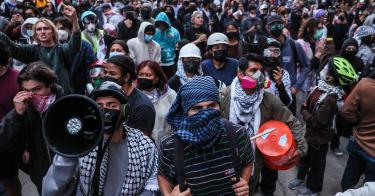Colleges are considering suspensions and expulsions for students who vandalized campuses and committed violence over the last month. These consequences are entirely appropriate, and overdue. School officials in North Carolina are even reallocating more funds to campus safety.
What took so long? The answer may help prevent violent riots on campuses in the future.
MIT officials recently announced they were suspending “dozens” of students who forced their way back into the area of campus where students had set up encampments. School personnel had warned those encamped, then cleared the tents and set up fencing around the area, telling students not to re-enter. Students proceeded to break through the fences—ignoring the warnings and destroying property.
Now, school administrators have announced sanctions are coming.
Events such as these have happened at schools nationwide. The incidents at MIT, UCLA, Columbia University and elsewhere were not examples of free speech. These were violent acts showing disregard for law and campus rules. School officials should not have waited as long as they did to call law enforcement, and the rioters who were not students, faculty or college staff should face charges. But administrators should be considering suspensions and expulsions for students involved.
>>> No Students, Your Encampment Is Not an Exercise of Free Speech
College personnel are partly to blame for the disruptions that universities faced over the last month. Campus riots have a long history, but in the most recent iterations of campus unrest dating back at least as far as 2015, colleges were slow to respond to students and rioters who de-platformed or shouted down professors and invited lecturers. Middlebury College in Vermont and Evergreen State College were just a few of the sites of violent shout-downs over the last decade.
Students regurgitated the Marxist slogans from critical race theory and diversity, equity and inclusion (DEI) as they de-platformed speakers—and in some cases, college administrators did not punish students. Predictably, surveys over the last decade have found that students are afraid to speak their minds on campus for fear of being canceled, shouted down—or worse.
Blocking someone else’s expressive rights is not a protected form of speech. Yet surveys found that some on campus approved of violence in the face of ideas with which they disagree.
In response to the shout-downs at Middlebury and the like, state lawmakers around the country—Alabama, Colorado, North Carolina, Tennessee and more—adopted provisions to reinforce the U.S. Constitution and protect free-speech rights. But with few notable exceptions, lawmakers did not include provisions that required school administrators to consider suspension or expulsion when students de-platformed a speaker or otherwise engaged in violence.
The message to students was clear: You can be disruptive with minimal or no consequences. Today, however, students have pushed the bounds even further, creating so much disturbance that some schools were forced to cancel classes and graduation ceremonies because campuses were not physically safe for anyone.
Lawmakers in North Carolina and Arizona were among the few who included disciplinary sanctions in provisions adopted after the outbreak of shout-downs between 2015 and the school closures caused by COVID-19. School officials should copy the University of North Carolina Board of Trustees’ latest decision to close its “diversity, equity and inclusion” office and reallocate spending to campus safety.
>>> Confronting the Campus Revolutionary Wannabes
DEI offices promote censorship by supporting bias response teams, which courts have found to “chill” speech. The offices also promote racial bias in college admissions and other school functions—none of which improves school safety or the free exchange of ideas.
Had school personnel acted decisively during riots over the last 10 years, consistently suspending or expelling violent students, perhaps disrupters would have had second thoughts. State lawmakers should revisit their conduct codes and require public college administrators to involve law enforcement and consider suspension or expulsion when students destroy school property, injure others, violate free-speech protections or otherwise commit violence.
Considering suspension or expulsion to counter—and perhaps prevent—violence is not new. Yale University officials recommended these consequences in the Woodward Report issued in 1974, a seminal document protecting campus speech.
College educators must teach students the difference between free speech and violence. The former deserves protection. The latter should be met with consequences.
This piece originally appeared in MSN




